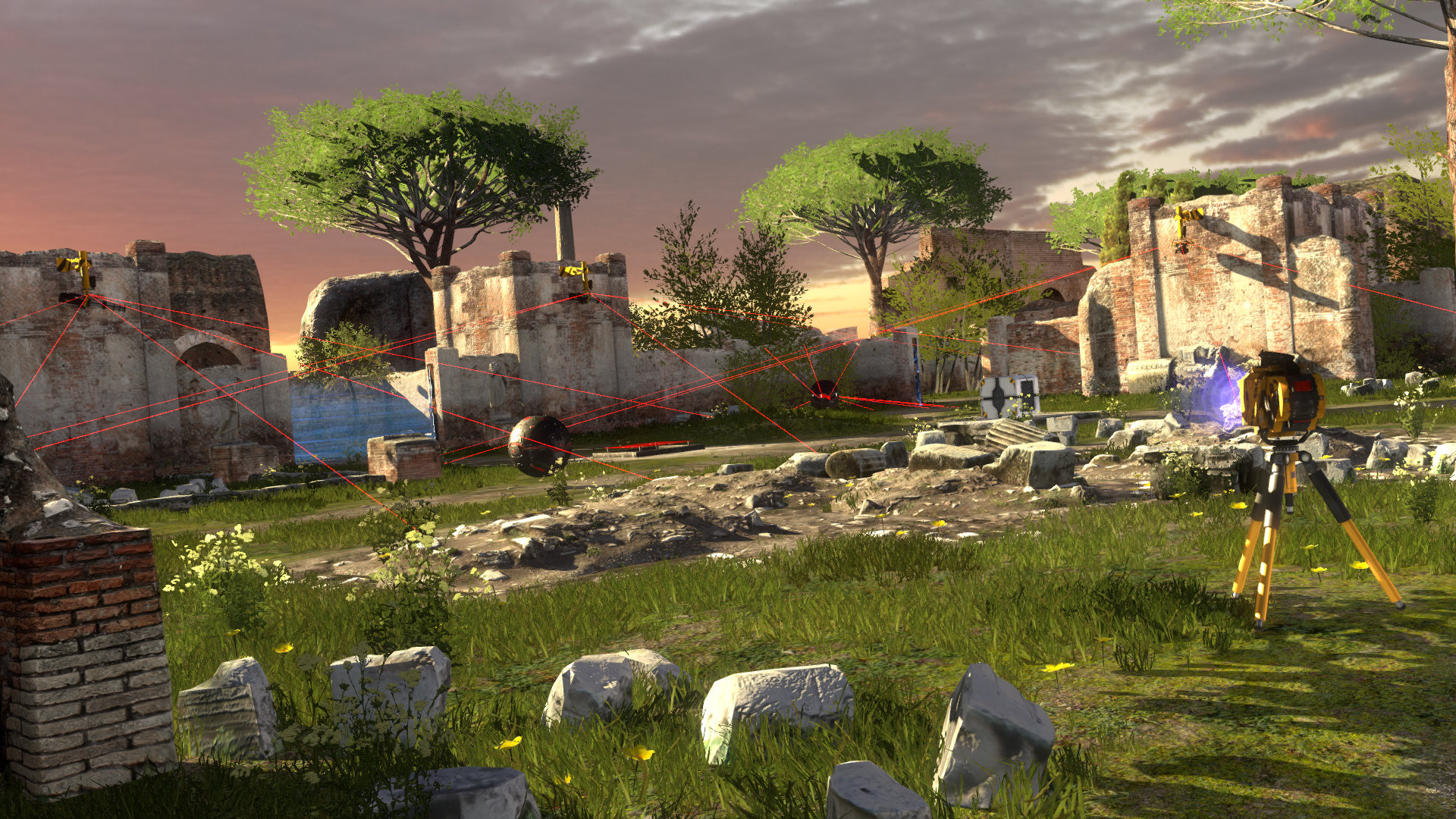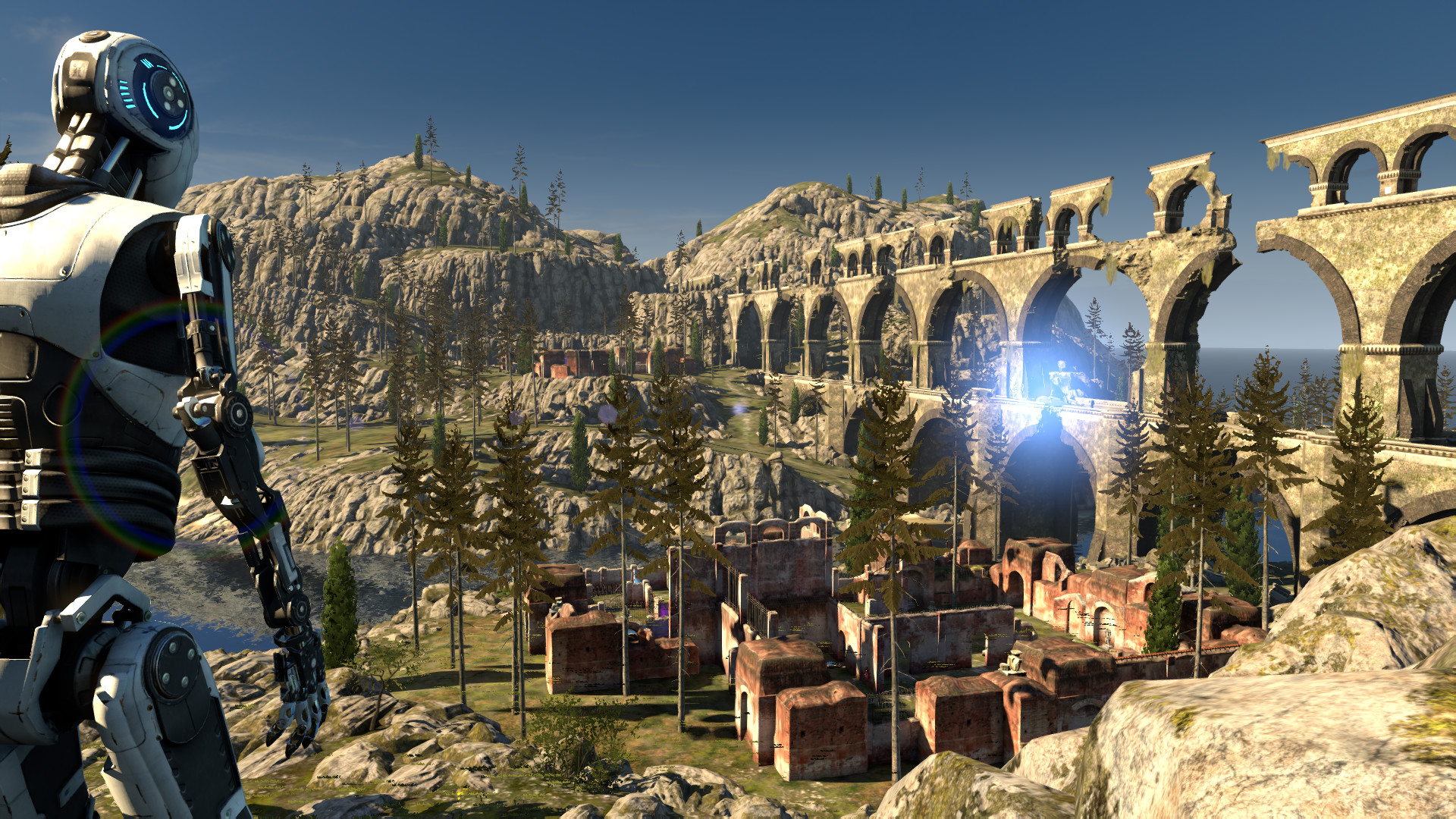Search
[{{{type}}}] {{{reason}}}
{{/data.error.root_cause}}{{{_source.title}}} {{#_source.showPrice}} {{{_source.displayPrice}}} {{/_source.showPrice}}
{{#_source.showLink}} {{/_source.showLink}} {{#_source.showDate}}{{{_source.displayDate}}}
{{/_source.showDate}}{{{_source.description}}}
{{#_source.additionalInfo}}{{#_source.additionalFields}} {{#title}} {{{label}}}: {{{title}}} {{/title}} {{/_source.additionalFields}}
{{/_source.additionalInfo}}- Details
- Category: Computer
- By Michael Desmond
- Hits: 7598
The Talos Principle (PC)

The Talos Principle
Developed By: Croteam
Published By: Devolver Digital
Released: December 11, 2014
Available On: Windows, macOS, Linux, Android, PS4
Genre: Puzzle
ESRB Rating: E10
Number of Players: Single-player offline. No multi-player option.
Price: $39.99
(Humble Store Link)
In the beginning, you awaken to a garden world of ancient ruins. A deep male voice emanates from the heavens, introducing himself as "Elohim." Elohim, which is the Hebrew word for "God" in Genesis and elsewhere in the Bible, tells you that he has a task for you, to collect his sigils, and that success will earn you entrance into paradise. You set forth on the only path open to you and soon discover one of the sigil chambers, which is an elaborate test designed by Elohim to measure your devotion. Success earns you a sigil, the first of many. What will you do next? Will you persevere through the trials and collect all of Elohim's sigils? Will you abandon Elohim and forge your own paths? Will you discover the secrets Elohim has hidden throughout his garden? Only you can decide.
In The Talos Principle, you play as an android (a robot that looks like a human). You experience "life" in a digital environment called "Elohim's Garden." Throughout the garden there are various sigil chambers, designed to guard the sigil within from the unworthy. The tasks and tools needed to complete these tests and retrieve the sigil within vary and range in difficulty from childish to ridiculous. The bulk of the game is spent solving these puzzles, either by deducing the solution, using trial-and-error, or looking up the solution on a wiki (guilty as charged for some of the harder instances).
Beyond the solving of puzzles, there are computer terminals spread throughout the landscapes of the garden. These terminals contain lore, memos, emails and other correspondence that provide clues as to the state of the non-digital world that begat the digital world you are experiencing.
Also within the computer terminals (which look and function a lot like the old Apple IIe or an IBM 486 running DOS) there exists a program called "Milton." Milton functions as part Systems Administrator, part Satan, and part philosophy professor. Throughout the course of the game, Milton will confront you through the terminal with a philosophical brain-teaser. The purpose of Milton seems to be to plant doubts in your "mind" about following Elohim, or to make you think about the "world" in a broader sense. Some responses to his theoretical questions generate a very "angry philosophy professor" response from Milton, often loaded with sarcasm or scathing commentary on your state of mind or logical conclusions. Most of these responses stem from siding with Elohim, or when expressing the value of obedience to Elohim. Other responses invoke a happy professorial response, but obviously only when Milton thinks you've reacted in a way that makes sense to him, such as the pursuit of free will, or the pointlessness of following Elohim. If you're very good in dealing with Milton, you can eventually shut him down by causing a logical loop failure in his programming, similar to how the "War Games" computer figured out that there can be no winners in "Global Thermonuclear War." There is an achievement for accomplishing this feat of logical prowess.

Strong Points: Progressively challenging puzzles that enhance your skills as they teach you the different methods and tools for solving the puzzles. Even so, some puzzles are ridiculously difficult later on. Questions about God, morality, obedience to a higher power, and philosophy make the game about more than simply solving puzzles.
Weak Points: If difficulty is a weakness, then some of the puzzles are definitely hard to master later on.
Moral Warnings: There are turrets that fire bullets at the player and orbs that function as seeker bombs. The philosophical nature of some of the interactions could lead some to question their faith in God. The game presents the ideas of free-will and personal choice as one of their primary values, yet choosing to obey God is treated as a failure.
In addition to the sigils and the computer interface, there are signs left behind by other wanderers through Elohim's Garden. These appear as QR codes painted in white paint on various surfaces throughout the garden. You appear to be able to decode these QR codes innately, as simply looking at one will display the message it conveys directly to your optical receivers. They include the username of the entity that left it behind, as well as the "build number" of the entity. You can even add your own QR code messages occasionally as you find white paint buckets scattered throughout the landscape. Doing so will display your username as your Steam handle (on Windows, Mac and Linux, and presumably as your online profile username on PS4). It will also display your own build number.
Another batch of puzzles, beyond the sigils, are collectible stars. In almost every garden there are stars that can be collected. In general, the garden you are in will inform you of the number of stars present in that area by posting them on the signs that also tell you how many sigils are there. These stars unlock special gardens that only the most dedicated completionists need accomplish. Being one such person, I collected them all. Retrieving the stars almost always requires some degree of "out of the box" thinking. In some cases, there are stars in places that you would not expect them to be found (because they are not posted anywhere, or they are outside of a particular garden area) and these require you to do things that nobody would think to do, such as assuming there is a star to be found in that particular area in the first place, followed by base jumping from a ridiculous height into a tiny hole that you cannot even see. I managed to collect them all by looking up several of them (the aforementioned one included) on a wiki.
There are also Easter eggs aplenty to be found for those that like looking for non-necessary but amusing hidden content. There are audio recordings from someone from the non-digital world, holo-videos from other wanderers, tombs of guardians, and even a cat.
In terms of gameplay, the interface is very similar to first-person adventure/puzzle games like Portal, where you experience the game as if seeing the world through your own eyes. The keyboard/mouse combination is generally preferred, but gamepad control is a viable option as well.
Graphically, the game is nicely rendered. The digital environments you experience betray their own digital nature with occasional glitches, in the form of static distortions and graphical corruption in places. Borders of the worlds announce themselves by having an audio loop of Elohim begin quickly speaking some scripture-esque phrases over and over. The volume of the loop gets progressively louder as you approach the border. Once you reach the border you are immediately teleported back to the entrance portal for that garden. My only nitpick is that much of the environment is recycled. This may have been done deliberately by the designers, to reinforce the idea of the digital nature of the world you experience, but it's something I noticed that could have been improved.

Higher is better
(10/10 is perfect)
Game Score - 92%
Gameplay - 17/20
Graphics - 9/10
Sound - 10/10
Stability - 5/5
Controls - 5/5
Morality Score - 86%
Violence - 8/10
Language - 10/10
Sexual Content - 10/10
Occult/Supernatural - 10/10
Cultural/Moral/Ethical - 5/10
The sound effects are really good. There is some background music playing which is thematically appropriate. When the graphical glitches occur there is usually a feedback pop or electrical distortion sound to reinforce the presence of a glitch and the reality of the digital nature of your world. Elohim's tone and register sounds properly deific.
Christians or others with a strong belief in God should object to how the game presents obedience to Elohim as a failure of independence, and if you choose the obedience ending, you reboot into a new firmware version and start the game over, indicating that the game considers this path a failure. In terms of morality, this is the greatest failure of this game. When you take the situation the game presents in context, it is clearly demeaning both Christianity and Judaism deliberately, since "Elohim" is the Hebrew word translated, "God" in Genesis and elsewhere in the Old Testament or Torah. In Genesis, Elohim creates man, puts him in a garden, and gives him both a task and a single thing to abstain from. These same things are done by the "Elohim" program in The Talos Principle as well, only in this case obeying him, avoiding the prohibition and completing his task are treated as a failure (you "lose" the game and have to restart), while disobeying him (i.e. sinning) is the only way to experience the end of the game in any real sense. I don't like philosophical bullies either, which is what the Milton program was, so while I took great joy in shutting him down with my logic skills, it was really a hollow victory because if you allow the end results to inform your conclusion, Milton ended up being right all along.
There is a small degree of violence directed at you in the game, though there are no directly aggressive actions you can take, even in self-defense. While you cannot technically "die" (or even cease functioning permanently) some of the tests involve evading mounted minigun turrets and roving smart bombs, both of which function like one would expect. The difference being that when one of these devices would normally "kill" you, instead you just teleport back to the beginning of the instance instead of "dying." You never see an explosion, or experience any visual representation that implies that you were actually shot or exploded. The closest thing you get is the sound of gunfire or of an explosion immediately prior to being reset to the start of the instance.
The Talos Principle took me 31 hours to complete 3 different endings, which could be done in a single playthrough by reloading. At nearly $40, this is not a bad price for a game of this length and complexity. Also, there is a DLC available which I did not test called "The Road to Gehenna" available for $14.99. ("Gehenna" is a Hebrew word used in the Old Testament usually translated "hell.") So, if you like puzzle games similar to Portal, like challenging logic puzzles, or are a fan of philosophy you will very likely experience hours of enjoyment from playing The Talos Principle.
-OrionStar1979




